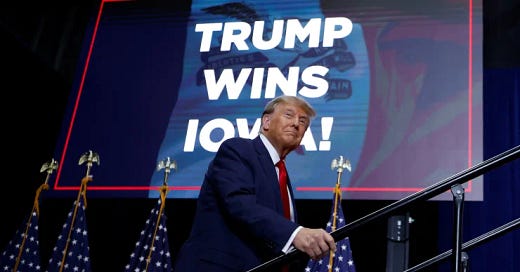Is Donald Trump the inevitable GOP winner?
Trump's Iowa win was not entirely what it seemed. But does it matter?
Prevailing wisdom has it Donald Trump will become the GOP candidate in November’s U.S. presidential election. He’s unbeatable. So, why bother trying?
Trump’s commanding win in the Iowa caucuses proves it.
Or, does it?
Trump’s Iowa results were less spectacular than they appear
Forty Republican delegates were up for grabs in the Iowa caucuses. Trump won 20 of them. His nearest competitor, Florida governor Ron DeSantis, got just 8. Clearly, a commanding victory for Trump.
But…
Half of Iowa’s caucus-goers voted for a candidate that was not named Donald Trump. Half of Iowa’s GOP delegates were not allocated to Trump.
Donald Trump is such a powerful personality and commanding force in the Republican Party that he’s a “love him” or “hate him” candidate. If that’s true, then it may be unlikely those Republicans who voted against Trump will ever come around to support him – meaning they may eventually coalesce around the last non-Trump candidate standing.
In a two-way race, 50 per cent is too close to call.
Even though Vivek Ramaswamy suspended his campaign after the Iowa caucuses and endorsed front running Trump, that does not mean voters who chose Ramaswamy in Iowa will follow him to the Trump camp. Even though Ramaswamy “suspended” his campaign and did not “end” it – the delegates bound to him in Iowa are, ultimately, free agents in a world without Ramaswamy in contention. If Ramaswamy voters liked Trump, they would have voted for Trump in the first place. Their votes may, instead, go to whichever “not Trump” candidate remains at the end of the day – or, they may simply sit out the election cycle altogether.
Voter turnout was very low in Iowa. Just 110,000 of the 752,000 registered Republicans turned out to vote in the Iowa caucuses. That’s 14.6 percent. Half of them voted for Trump: that’s a whopping 7.4 percent of Iowa’s Republicans. Not enough to win a general election.
Weather was terrible in Iowa during the caucuses, no doubt deterring people from attending. However, Trump is a powerful magnetic force in politics and it’s reasonable to suspect his supporters – more than any others – would have made the trek through Hell or high water to support their leader. So, Iowa caucus results may be skewed in Trump’s favour. Still, he could muster just 51% of the vote.
We’ll see how that shakes out in New Hampshire this week.
The facts may not matter in the Primaries
So, Trump’s commanding victory in Iowa may not be as commanding as it first appears. But, will it matter?
The prevailing narrative is thus: Trump is the obvious and only choice for Republicans. Whether that’s true may be irrelevant. If “never Trumpers” are resigned to his ultimate victory, they may simply not show up to vote for any alternative – and Trump will win handily.
This is the narrative Trump’s campaign is pushing. By monopolizing the available media bandwidth – with campaign messaging or news of Trump’s myriad legal battles (positive or negative) – they suck the air out of the room, leaving little or no opportunity to even hear what other candidates are saying or doing. If Trump is the only Republican in the conversation, it’s hard not to believe he is destined to win – so why even vote?
It’s a strategy that’s worked before. And it can work again.
How to beat Trump in the primaries
Trump can be beaten in the GOP primaries only if his opponents quickly whittle themselves down to a single “non-Trump” choice for Republican voters. That is the only way “never Trumpers” will see enough hope to bother turning up to vote.
Will the other GOP hopefuls do this? It seems unlikely. First, because some of them truly want to be president and will hold on to the last. Second, because some of them (e.g. Ramaswamy) have no real interest in becoming president, but are entirely invested in presenting themselves as “king makers” who will throw their support to the leader in hopes of a swish appointment in his administration.
Will any of it matter on Election Day?
It may be inevitable that Donald Trump is the Republican nominee for president in November. Republicans for and against Trump may be resigned to this. But, that doesn’t mean the rest of American voters are.
Trump has never won the popular vote in any presidential election, so there have always been enough votes to beat him – as happened in 2020. The question for both GOP and Democrat campaign strategists is: where are those votes? Because, the number of votes is ultimately irrelevant in a U.S. presidential election – the distribution of those votes to win a majority of Electoral College delegates is what counts.
All said and done, we are left with the fact elections are never about choosing the best person for the job. They are about choosing the best person on the ballot for the job. And, as has too often been the case in elections world wide and especially in the U.S.A., there simply may be, once again, no good choices on the U.S. presidential ballot in November.
Joe Biden is a weak and unappealing candidate to most Americans. Donald Trump is a boorish and unacceptable choice to at least half of American voters. Who will win in a re-match showdown between the two? Certainly, not the best man for the job.




